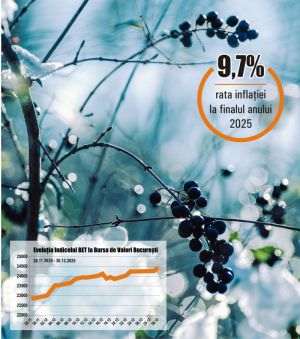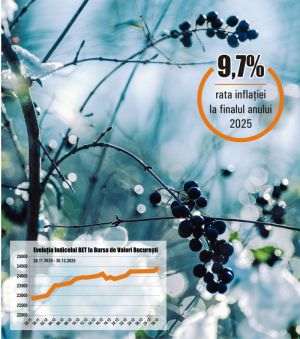• The balance of Raiffeisen Bank"s corporate loans: 1.5 billion Euros
• In his rush for market share, the banks have taken risks that they"re now paying for
The political instability, the lack of vision and the inefficient management of public funds will keep us mired in the crisis this year as well, considers Marinel Burduja, first vice-president and the head of the corporate division of Raiffeisen Bank.
"Few people can give a clear answer when asked if they had plans for the country in 2011. Any serious country has its development strategy mapped out for 15 to 20 years in advance. I don"t see any economic growth in 2011", he said.
Even though exports, which could support the economic recovery - have increased, the official of Raiffeisen considers that Romania is not a true exporting country: "We are in fact exporters of products which are only in part produced locally. For instance, Dacia, is a product of Renault, of the French car industry. Romania only hosts a production line.
The production and export of Nokia phones also doesn"t qualify as an export which is 100% Romanian.
We could in turn successfully export products which are 100% produced domestically: cement, grains, foodstuffs, agricultural machinery".
• "The appetite for borrowing is increasingly low"
Corporate demand for loans will be low this year as well, after last year"s drop, said the first vice-president of Raiffeisen: "There is an increasingly low appetite for loans. Borrowing helps to resume production and if possible, on a larger scale.
As long as such a severe crisis exists on the market, it will cause a drop in consumption, which in turn will generate a drop in production, leading in turn to a decrease in the demand for loans."
Raiffeisen Bank ended the year 2010 with a portfolio of 1.5 billion Euros in corporate loans.
In 2010, the bank has seen demand for loans from the companies in sectors such as the metallurgic industry, shipmaking, aluminum, agriculture, and to a lesser extent, in the services sector.
A profitable segment this year would be the production of energy, said Marinel Burduja, who added:
"The projects for the improvement of the energy efficiency and thermal rehabilitation, as well as the projects for road and urban infrastructure (passageways and parking lots) are also on the list of projects eligible for lending".
• Raiffeisen Bank"s ratio of non-performing loans is about 6%
In 2010, the bank began foreclosing on the assets of companies that were unable to meet their payments.
Raiffeisen has a ratio of 6% non-performing loans, said Marinel Burduja, who added: "We don"t have any problems caused by an excessively high number of non-performing loans affecting our lending activities. But the thing that worries me is the unprofessional and reckless behavior of many managers."
The first vice-president of the bank says that, in many cases, companies abuse the law and file for insolvency, in which case their payment of debts gets done using different legal procedures.
"In doing that, companies postpone the payment of their debts to the bank, and the state comes out the biggest loser, because it no longer collects taxes and VAT.
A lot of times, banks are affected as well, because they no longer issue loans, and they no longer perform normal operations for some of their corporate customers."
• "All the companies complain about the state"
As he talks a lot to people from the various companies that interact with "Raiffeisen Bank", Marinel Burduja says that all companies complain about the state"s arrears or about the fact that they are not receiving their subsidies in the farming sector.
"The state actually hinders the economy, instead of helping it grow".
Compared to the period prior to the economic crisis, the financial ratios of companies have severely worsened, the bank official said, and he added: "The crisis period began in October 2008. 2008 was a year when many people were under the impression that they doing a good job managing Romania"s economy, but they were just fooling themselves.
No one gave any thought to the idea that the pace of growth in question was artificial. I think that the banks are to blame as well. In their struggle for market shares, they have taken on risks that they are paying for today".
• In the policies of the Romanian governments, the absorption of European funds was just a slogan
For all the governments that held power in Romania, the absorption of European funds was only a slogan, a bunch of nice sounding words, but none of them passed any concrete measures to attract European funds, Marinel Burduja says.
Loans intended to co-finance projects which attracted European funds only account for an insignificant share of Raiffeisen"s portfolio of corporate loans.
"I don"t think we are ready for this. The European Union has all this money on hand for us and it"s a real shame that Romania, with its fragile economy, every year pays out more to the EU budget than it takes in", the Raiffeisen official concluded.
• "There are companies that did not save money in 2010, because they had nothing to set aside, whereas others have considerable cash reserves"
"Some companies couldn"t afford to save anything in 2010, whereas others have lots of cash on hand: all of the companies in the distribution sector, from the distributors of oil products to gas and energy distributors. We hold the deposits of such customers. Retailers are also our clients".
In 2010, we had greater stability on the asset side (loans- ed. note) then on the liabilities side (savings - ed. note), where fluctuations are greater, on the market level, said Marinel Burduja, who added: "Companies that withdrew their money from banks did not do so because they no longer had cash -flow. They did so to receive the best interest rates on temporary investments".
The deposits attracted by Raiffeisen Bank from corporate customers have only seen an insignificant increase in 2010.
The deposits attracted by Raiffeisen Bank from corporate customers have only seen an insignificant increase in 2010..
•
Companies abuse the law and file for insolvency, in which case their payment of debts gets done using different legal procedures.
•
In 2010, we had greater stability on the asset side (loans- ed. note) then in the liabilities side (savings - ed. note), where fluctuations are greater, on the market level,
•
While on the asset side (loans - ed. note) there is a higher stability in the market, on the liabilities side (deposits - ed. note), fluctuations are much greater.








































